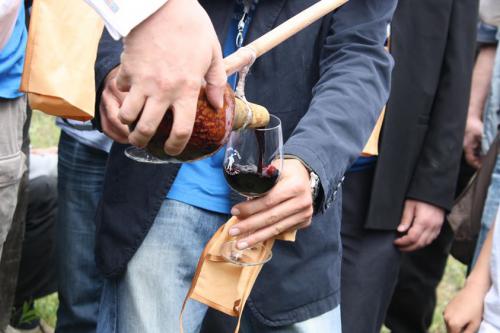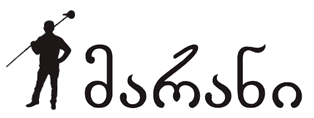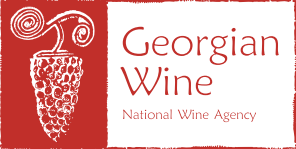
By Levan Sepiskveradze
The upcoming New Wine Festival, while returning for its fifth year on May 24th, is expected with an alacrity by the wine connoisseurs and especially, the winemakers, who have been selected through sighted tasting to showcase their wines at the event.
As you may already know, artisan wines of boutique cellars or family-owned wineries are usually selected through the degustation performed by a tasting panel of the Wine Club members and wine experts. This process ensures that the festival features only quality wines while cultivating a fine image of the event and of Georgian wine iself.
The Wine Club members and wine specialists sampled 84 such wines at the natural wines bar, Vino Underground, and almost half of them were selected for the festival. It was a sighted tasting where the tasters knew the origins of the wines as they assessed them.
There was a number of criteria used for selecting these wines: 1. A wine had to be in a good condition. 2. A varietal of a wine had to display certain qualities including flavor, color and aroma inherent in the grape’s personality. 3. There were no wines of hybrid grape varieties allowed. 4. All the wine producing regions of Georgia were given equal opportunities to participate in the tasting contest.
Because there were a large number of wines submitted, the tasters in the panel were divided into two groups. The procedure was to taste a set of wines by each group that didn’t include the samples of another group. Hence, they were able to make authoritative assessments without the involvement of another group members. However, if one of the two groups felt indecisive about a particular wine, the members of both teams would discuss the case together in order to come up with the right results and make scrupulous decisions. There were many cases when the wine specialists and the Wine Club members in the panel didn’t quite agree, still, the verdicts were reached by consensus.
Indeed, there were ambivalent opinions about the results of the wine selection. David Chichua, a wine maker, was one of those people who favored the decisions made by the panel experts.
David Chichua, a winemaker and a wine expert: Overall, the wines selected for the festival are quality wines, epecially the whites. Even though our experience from previous years showed that most of the fine wines came from the Kakheti region, this general tendency has changed this year. Now we’ve been mainly impressed by the wines from Western Georgia and especially, by those from the Kartli region. The most striking feature of almost every wine from Kartli has been the flamboyance of the wines as the quality was surprisingly impressive too. Fortunately, Georgian wine lovers will have the opportunity to taste most of these wines at the festival.
2013 has been a good vintage and along with ordinary, traditional styles, we’ve been impressed by the experimentation and spine-tingling complexity among the wines submitted for the panel tasting. This means some of the winemakers have allowed themselves to take creative new approaches and presented new ideas on wine production in the face of standardisation; And of course, it’s always a good idea to treat wine as an “art form.”
However, there were some low-quality samples of hybrid reds as well. Even though we welcome trials, we were not willing to stimulate the practice of hybrid wines made by crossing different varietals and therefore, no such wines were selected for the festival. Overall, we’ve noticed a slight progress in the quality of wines compared to previous years and we are also happy that some of the names feature persistently on the list of festival participants.”
David Chichua is a frequent visitor of the tasting events hosted by the Wine Club. Unlike him, it was the first time for Misha Meskhi, a wine expert, to participate in the degustation as a tasting panel member. He thinks that the process of exploring the country’s winemaking potential has just begun.
Misha Meskhi, a wine specialist: “I find it remarkable that the New Wine Festival has already established itself as an annual event enhancing the reputation of Georgian wine. Its founder, the Wine Club, has given the opportunity to the local artisans and vintners to promote their wines through this festival that incorporates wine tastings and therefore, it has become one of the most important events giving rise to the quality wines in Georgia. Thus, we realize the importance of selecting the right products for the festival.
There were many interesting samples submitted for the panel tasting and also some experimental trials that I enjoyed scrutinizing. What’s most important, the wine producers are now interested in developing the wine industry more than ever as well as the artisans feel more responsible for producing quality wines.
On the other hand, we’ve come to detect various problems during this degustation, especially, the issues regarding the wine spoilage due to volatile acidity (VA) also referred to as vinegar taint, or other compounds that cause wine faults. Like most wine producing countries, we should aim at improving the quality of our wines and making a gradual transition from the bulk wine to the bottled wine production.
According to George Samanishvili, a wine expert, most of the samples presented at the degustation lacked quality and were not impressive. He expressed his concern about the fact that some of the winemakers didn’t meet the cleaning and sanitation needs in their wineries. As a result, the lack of cellar hygiene created various cases of wine spoilage that was quite apparent in the samples submitted this year.
George Samanishvili, a wine expert: “The problem of poor sanitation is still common as some of the winemakers fail to establish and maintain a microbiologically stable product. They could have easily preserved their wines by using sulfur dioxide or sorbate. However, many of them still don’t take these steps to ensure the quality of their wines. The samples we tasted suggested that the grapes were harvested in the right time letting them develop intense varietal flavors, however, a lapse in cleaning and sanitation caused the failure of some of these wines.
On the other hand, there were wines that lacked a hefty blast of alcohol or soft acidity because they were harvested too early. For example, one of the wines of Ojaleshi varietal had issues as it was obvious the components from the skins and stems were overextracted which resulted in the poor wine quality.
Our group of the panel members tasted 42 wine samples and in my opinion, none of them was a standout. There was one sample of Usakhelouri varietal I favored the most, though I wasn’t stunned by it either. Indeed, I remain hopeful that these issues will be solved sooner or later.”
Irakli Cholobargia, the representative of the National Wine Agency and a wine specialist, has similar opinion about the subject. As he stated, the crops of the most wines were harvested too early not allowing the flavor compounds develop, which resulted in underdeveloped wines.
Irakli Cholobargia: “Some of the problems that came to ligh while we were tasting the samples were the disregard for the ripeness factor and some technical issues. For example, there were wines stored in plastic tanks. Also the wines from Western Georgia had most flaws and faults. Still, my favorite one was from the Imereti region, a fine example of experimental trial which was a blend of Otskhanuri sapere, Tsitska and Tsolikouri varietals.
During the degustation, I got a compelling idea that we should allow all the winemakers who are willing to participate in the event to showcase their wines at the festival. This will give us the opportunity to discuss the flaws and faults of their wines with them and thus, help them improve the quality of their products. Hopefully, next year we will be able to facilitate this kind of transition and create a new setup for the festival that I find very important.”
In the end, here is the list of the artisan wines that have been selected for the New Wine Festival 2014, held at Tbilisi Ethnographic Museum as usual, on May 24. Some of these wines are the first time participants and this is what makes the New Wine Festival the most important and significant wine event of the year: From the new venues to established favourites the festival highlights the spirit of Georgian wine and provides an exciting experience for wine lovers.
Selected Wine makers and their Wines:
Solomon Tetrashvili. Rkatsiteli wine.
Zurab Ebelashvili, Rkatsiteli, the village of Zemo Khodasheni, Akhmeta municipality, Kakheti region.
Tornike Aghniashvili, Rkatsiteli and Mtsvane, the village of Shilda, Kvareli municipality, Kakheti region.
Merab Germanishvili, Saperavi, the town of Akhmeta, Kakheti region.
Levan Shashiashvili, Mtsvane and Rkatsiteli, the town of Akhmeta, Kakheti region.
Merab Mirtskhulava, Rkatsiteli, Mtsvane, Mukuzani, Chinuri and Shavkapito, the village of Vazisubani, Gurjaani municipality, Kakheti region.
Jemal Veshapidze, Saperavi wine made in qvevri, the village of Didi Chailuri, Sagarejo municipality, Kakheti region.
George Papuashvili, Saperavi, the village of Akhalsopeli, Kvareli municipality, Kakheti region.
Gela Gabruashvili, Saperavi and rkatsiteli, the village of Akhalsheni, Gurjaani Municipality, Kakheti region.
Irakli Rostomashvili, Rkatsiteli, the village of Argokhi, Akhmeta municipality, Kakheti region.
Erekle Loladze, Saperavi, the village of Mukuzani, Gurjaani Municipality, Kakheti region.
Giga Loladze, Rkatsiteli-Muskaturi and Rkatsiteli, the village of Chailuri, Sagarejo municipality, Kakheti region.
Alex Bardanashvili, Rkatsiteli, the city of Telavi, Kakheti region.
Koba Kvatchrelishvili, Kisi wine made in qvevri and Kisi-Khikhvi wine blend made in qvevri, the village of Chikaani, Naotari micro-zone, Kvareli municipality, Kakheti region.
Nikoloz Totladze, Rkatsiteli, the village of Gulgula, Telavi municipality, Kakheti region.
Ioseb Okromchedlishvili, Saperavi and Rkatsiteli, the village of Kakabeti, Sagarejo municipality, Kakheti region.
Mikheil Majhgarashvili, Mtsvane and Rkatsiteli, Kakheti region.
George Chikhoria, Rkatsiteli, the Gurjaani municipality, Kakheti region.
Archil Khazuashvili and Nugzar Khazuashvili, Rkatsiteli, the town of Akhmeta, Kakheti region.
Vasiko Nikolaishvili and Anna Nikolaishvili, Saperavi and Rkatsiteli, Gurjaani municipality, Kakheti region.
Vakhtang Matcharashvili, Rkatsiteli, the village of Akhalsheni, Kakheti region.
Grigol Lelashvili, Kisi, Tavkveri and Shavkapito, the village of Chikaani, Kvareli region.
Sulkhan Gulashvili and Lado Gulashvili, Saperavi, the village of Kardanakhi, Kakheti region.
Ilia Tigishvili, Chinuri, the village of Chardakhi, Mtskheta municipality.
Alexander Beruashvili, Chinuri, the town of Kareli, Kartli region.
Avtandil Darakhvelidze, Tavkveri and Chinuri, the village of Akhtala, Kaspi municipality, Kartli region.
Levan Cholokashvili, Chinuri, Goruli and Tskapa, Akhtala hills vineyards located between Kaspi and the village of Kavtiskhevi, Kaspi municipality, Kartli region.
Beka Aslanishvili, Chinuri wine made in qvevri, the village of Chardakhi, Mtskheta municipality, Kartli region.
Gogi Dvalishvili, Chinuri, Goruli Mtsvane, Tavkveri and Atenuri, the village of Khidistavi, Gori municipality, Kartli region.
David Rekhviashvili, Rkatsiteli, the village of Ratevani, Bolnisi municipality, Kartli region.
David Kapanadze, Otskhanuri Sapere, Tsitska and Tsolikouri wines. Also Otskhanuri Sapere, Tsitska and Tsolikouri wines (made with skin contact), the village of Tklapi Vake, Zestaponi municipality, Imereti region.
Rati Arshilava, Aleksandreuli and Otskhanuri, the village of Obcha, Imereti region.
Mamuka Sulamanidze, Tsitska-Tsolikouri wine blend, the village of Tskhratskaro, Zestaponi municipality, Imereti region.
Luka Bibineishvili, Chkhaveri, the village of Egre, Khelvachauri Municipality, Achara region.
Kakhaber Vakhtangadze, Aleksandreuli, the village of Jvarisa, Ambrolauri Municipality, Racha region.
Konstantine Berishvili, Usahelauri, the village of Okureshi, Lechkhumi region.
Translated by Tea Kokhreidze
© Georgian Wine Club/vinoge.com






